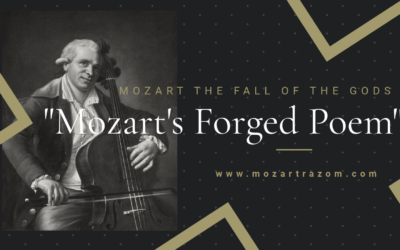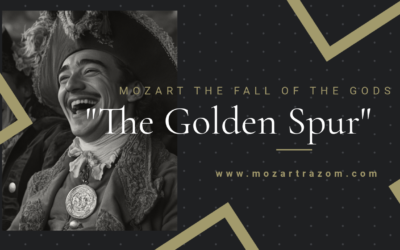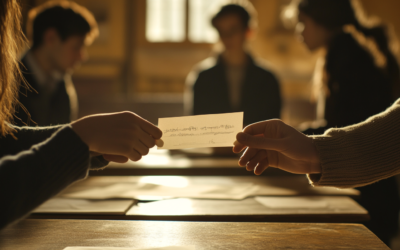A Revolutionary Encounter at Cremona Musica
Presenting Mozart: The Fall of the Gods at the World’s Most Prestigious Music Fair
We’re honored to have taken part in the remarkable atmosphere of Cremona Musica, a festival renowned worldwide for bringing together the finest names in music and lutherie. It’s here, at this grand fair, that we presented our latest work, Mozart: The Fall of the Gods. This book is the culmination of our research into Mozart’s true legacy, seeking to unravel the myth and bring clarity to his legacy with documented sources and in-depth analysis.
Mozart: The Fall of the Gods
This book offers a fresh and critical look at the life of Wolfgang Amadeus Mozart, challenging the myths that have surrounded him for centuries. We strip away the romanticised image of the “natural genius” and delve into the contradictions within Mozart’s extensive biographies. Backed by nearly 2,000 meticulously sourced citations, this work invites readers to explore a deeper, more complex understanding of Mozart. Perfect for those who wish to question the traditional narrative, this biography is a must-read for serious music lovers and historians.
"Cremona Musica: a global fairground where excellence meets exchange, and every voice is invited to the conversation."
@MozartrazoM
We’re honored to have taken part in the remarkable atmosphere of Cremona Musica, the world’s leading music fair and a global hub for musicians, luthiers, and music enthusiasts. Recognized as the premier international gathering for fine instruments and music professionals, Cremona Musica represents the pinnacle of musical excellence and innovation. To be invited to present at this prestigious event is a source of great pride for us, and we are grateful for the opportunity.
Our presentation of Mozart: The Fall of the Gods – Part Two was met with an exceptional response. Engaging with a diverse audience, we shared insights from our work and encouraged open discussion. This fair offers more than an exhibition space; it’s a unique arena for the respectful exchange of ideas and in-depth dialogue that pushes the boundaries of conventional musical scholarship.

Our second conference at Cremona Musica focused on the fascinating legacy of the Neapolitan school, specifically the study of partimenti, a unique pedagogical tool that influenced generations of composers. Alongside internationally acclaimed guitarist and soloist Maestro Edoardo Catemario, we explored the rich heritage of these musical exercises, illustrating their importance with select examples. The Maestro’s expertise brought new depth to our discussion, capturing the enduring relevance of the Neapolitan method and its influence on classical music.
Cremona Musica’s world-renowned reputation is built not only on its unmatched gathering of instruments and exhibitors but also on its high-quality events, featuring over two hundred performances, conferences, and masterclasses each year. For us, this fair was not merely a showcase but a milestone moment of dialogue and mutual enrichment. We extend our gratitude to the organizers, our fellow presenters, and the vibrant audience that made this year’s event truly memorable.
You May Also Like
#3 Leopold Mozart’s Literary Theft
Hidden within the Mozarteum’s archives lies a poem that has long been hailed as a tribute to the young Mozart children. But behind this innocent façade is a story of deception, literary theft, and one father’s ambition to rewrite history.
#4 The Golden Spur
While often portrayed as a prestigious award, the Golden Spur (Speron d’Oro) granted to Mozart in 1770 was far from a reflection of his musical genius. In this article, we delve into the true story behind this now-forgotten honour, its loss of value, and the role of Leopold Mozart’s ambitions in securing it.
Mozart Unmasked: The Untold Story of His Italian Years
Explore the lesser-known side of Wolfgang Amadé Mozart’s early years in Italy. ‘Mozart in Italy’ unveils the complexities, controversies, and hidden truths behind his formative experiences, guided by meticulous research and rare historical documents. Delve into a story that challenges the traditional narrative and offers a fresh perspective on one of history’s most enigmatic composers.
Another Example of Borrowed Genius
The myth of Mozart’s genius continues to collapse under the weight of his reliance on others’ ideas, with Leopold orchestrating his son’s supposed early brilliance.
A Genius or a Patchwork?
The genius of Mozart had yet to bloom, despite the anecdotes passed down to us. These concertos were not the work of a prodigy, but a collaborative effort between father and son, built on the music of others.
Myth, Reality, and the Hand of Martini
Mozart handed over Martini’s Antiphon, not his own, avoiding what could have been an embarrassing failure. The young prodigy had a lot to learn, and much of what followed was myth-making at its finest.







